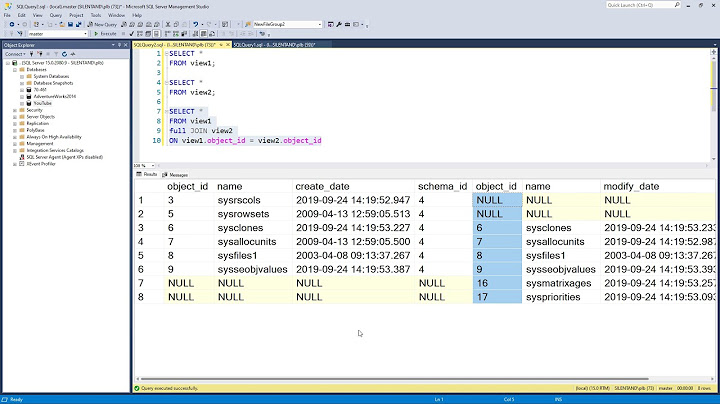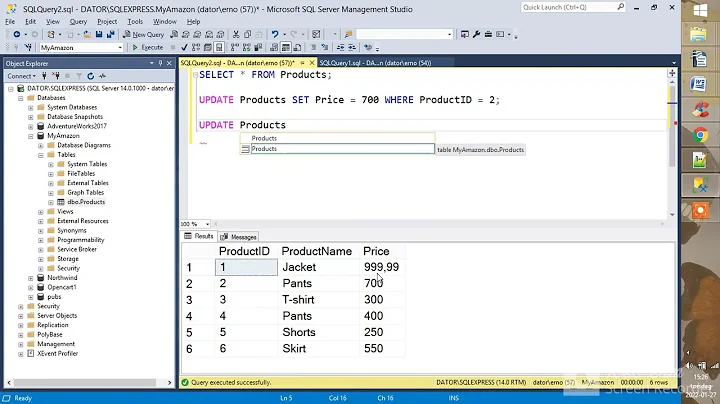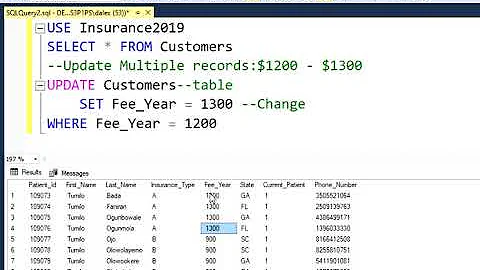How to properly handle two threads updating the same row in a database
Solution 1
Part 1 - Your problem
The main reason for you receiving this exception is that you are using Hibernate with optimistic locking. This basically tells you that either thread T1 or thread T2 have already updated the state to PARSED and now the other thread is holding old version of the row with smaller version than the one held in the database and trying to update the state to PARSED as well.
The question here is "Are the two threads trying to preserve the same data?". If the answer is yes then even if the last update succeed there shouldn't be any problem, because eventually they are updating the row to the same state. In that case you don't need Optimistic locking because your data will, in any case be in sync.
The main problem comes if after the state is set to RECIEVED if the two threads T1 and T2 actually depending on one another when reseting to the next status. In that case you need to ensure that if T1 has executed first(or vice versa) T2 needs to refresh the data for the updated row and re-apply its changes based on the changes already pushed by T1. In this case the solution is the following. If you encounter staleObjectException you basically need to refresh your data from the database and restart your operation.
Part 2 analysis on the link posted Possible hibernate exceptions when two threads update the same Object? Approach 1, this is more or less the last to update Wins situation. It more or less avoids the optimistic locking (the version counting). In case you don't have dependency from T1 to T2 or reverse in order to set status PARSED. This should be good.
Aproach 2 Optimistic Locking This is what you have now. The solution is to refresh the data and restart your operation.
Aproach 3 Row level DB lock The solution here is more or less the same as for approach 2 with the small correction that the Pessimistic lock dure. The main difference is that in this case it may be a READ lock and you might not be even able to read the data from the database in order to refresh it if it is PESSIMISTIC READ.
Aproach 4 application level synchronization There are many different ways to do synchronization. One example would be to actually arrange all your updates in a BlockingQueue or JMS queue(if you want it to be persistent) and push all updates from a single thread. To visualize it a bit T1 and T2 will put elements on the Queue and there will be a single T3 thread reading operations and pushing them to the Database server.
If you use application level synchronization you should be aware that no all structures can be distributes in a multi-server deployment.
Well I can't think of anything else for now :)
Solution 2
I'm not certain I understand the question, but it seems it would constitute a logic error for a thread T1 which is only processing, for example, records beginning with AA to mark the entire file as "Parsed"? What happens if, for example, your application crashes after T1 updates but while T2 is still processing BB records? Some BB records are likely to be lost, correct?
Anyhow, the crux of the issue is you have a race condition with two threads updating the same object. The stale object exception just means one of your threads lost the race. A better solution avoids a race entirely.
(I am assuming here that the individual record processing is idempotent, if that's not the case I think you have bigger problems as some failure modes will result in re-processing of records. If record processing has to happen once and only once, then you have a harder problem for which a message queue would probably be a better solution.)
I would leverage the functionality of java.util.concurrent to dispatch records out to threaded workers, and have the thread interacting with hibernate block until all records have been processed, at which point that thread can mark the file as "Parsed".
For example,
// do something like this during initialization, or use a Guava LoadingCache...
Map<RecordType, Executor> executors = new HashMap<>();
// note I'm assuming RecordType looks like an enum
executors.put(RecordType.AA_RECORD, Executors.newSingleThreadExecutor());
then as you process the file, you dispatch each record as follows, building up a list of futures corresponding to the status of the queued tasks. Let's assume successfully processing a record returns a boolean "true":
List<Future<Boolean>> tasks = new ArrayList<>();
for (Record record: file.getRecords()) {
Executor executorForRecord = executors.get(record.getRecordType());
tasks.add(executor.submit(new RecordProcessor(record)));
}
Now wait for all tasks to complete successfully - there are more elegant ways to do this, especially with Guava. Note you also need to deal with ExecutionException here if your task failed with an exception, I'm glossing over that here.
boolean allSuccess = true;
for (Future<Boolean> task: tasks) {
allSuccess = allSuccess && task.get();
if (!allSuccess) break;
}
// if all your tasks completed successfully, update the file record
if (allSuccess) {
file.setStatus("Parsed");
}
Solution 3
Assuming that each thread T1,T2 will parse different parts of the file, means no one override the other thread parsing. the best thing is to decouple your parsing process from the DB commit.
T1, T2 will do the parsing T3 or Main Thread will do the commit after both T1,T2 has finished. and i think in this approach its more correct to change the file status to Parsed only when both threads has finished.
you can think of T3 as CommitService class which wait till T1,T2 finsih and then commit to DB
CountDownLatch is a helpful tool to do it. and here is an Example
Related videos on Youtube
Gaurava Agarwal
What I do: Learn, Re-Use, Share, Improve What I am: Fast, Agile, Energetic
Updated on June 26, 2022Comments
-
 Gaurava Agarwal almost 2 years
Gaurava Agarwal almost 2 yearsI have a thread called
T1for reading a flat file and parsing it. I need to create a new thread calledT2for parsing some part of this file and later thisT2thread would need to update the status of the original entity, which is also being parsed and updated by the original threadT1.How can I handle this situation?I receive a flat file having the below sample records:
AAAA BBBB AACC BBCC AADD BBDDFirst this file is saved in database in
Receivedstatus. Now all the records starting withBBor withAAneed to be processed in a separate thread. Once it's successfully parsed, both threads will try to update the status of this file object in a database toParsed. In some cases, I getstaleObjectException. Edit: And the work done by any thread before the exception is lost. We are using optimistic locking. What is the best way of avoiding this problem?Possible hibernate exceptions when two threads update the same Object?
The above post helps to understand some part of it, but it does not help to resolve my problem.
-
 Koos Gadellaa almost 8 yearsSo, you have a flat file, and a race between two threads to update a field 'parsed' when either finishes? So it is allowable, given a file of one AA and a agazillion BB, that AA -parsing finishes in a millisecond, BB parsing 'never' finishes, and your status is set to 'parsed' ? Or should it be 'partially parsed', and only be 'completely parsed' when both AA and BB are done?
Koos Gadellaa almost 8 yearsSo, you have a flat file, and a race between two threads to update a field 'parsed' when either finishes? So it is allowable, given a file of one AA and a agazillion BB, that AA -parsing finishes in a millisecond, BB parsing 'never' finishes, and your status is set to 'parsed' ? Or should it be 'partially parsed', and only be 'completely parsed' when both AA and BB are done? -
 Gaurava Agarwal almost 8 yearsGood point. In most of the cases (99.99‰) both threads want to update status as parsed. Not too much difference. AA are payments.. BB are cheques. Not too much difference in quantity. Initial status is received, and end status is parsed. No in between status.
Gaurava Agarwal almost 8 yearsGood point. In most of the cases (99.99‰) both threads want to update status as parsed. Not too much difference. AA are payments.. BB are cheques. Not too much difference in quantity. Initial status is received, and end status is parsed. No in between status.
-
-
 Gaurava Agarwal almost 8 yearsI wish I can think such solution. I will give it a go. Keep u posted.
Gaurava Agarwal almost 8 yearsI wish I can think such solution. I will give it a go. Keep u posted. -
 Elia Rohana almost 8 yearsif you need any help with the implementation i can help, let me know
Elia Rohana almost 8 yearsif you need any help with the implementation i can help, let me know -
 Gaurava Agarwal almost 8 yearsSame feelings here, UnFortunately It's being done by some other team.
Gaurava Agarwal almost 8 yearsSame feelings here, UnFortunately It's being done by some other team. -
 Gaurava Agarwal almost 8 years"Are the two threads trying to preserve the same data?". same data or not, but in case thread gets exception work done before setting the status is lost. Sorry I didn't explain it that well. Will improve question.
Gaurava Agarwal almost 8 years"Are the two threads trying to preserve the same data?". same data or not, but in case thread gets exception work done before setting the status is lost. Sorry I didn't explain it that well. Will improve question. -
 Gaurava Agarwal almost 8 yearsYes I think refresh the object state in case of exception, or even in all the cases using synchronization is okay. Both the threads need to call same function.
Gaurava Agarwal almost 8 yearsYes I think refresh the object state in case of exception, or even in all the cases using synchronization is okay. Both the threads need to call same function. -
 Alexander Petrov almost 8 yearsWell it depends on your needs. It is perfectly fine to synchronize them and wait for each other as it is fine to just queue them up. For a common usage it really does not matter. It will start matter when you start dealing with huge amounts of data and massive parallelism. My advice is to use the simples pariah possible to implement. Also the cleanest and most readable. Performance is always secondary.
Alexander Petrov almost 8 yearsWell it depends on your needs. It is perfectly fine to synchronize them and wait for each other as it is fine to just queue them up. For a common usage it really does not matter. It will start matter when you start dealing with huge amounts of data and massive parallelism. My advice is to use the simples pariah possible to implement. Also the cleanest and most readable. Performance is always secondary.







